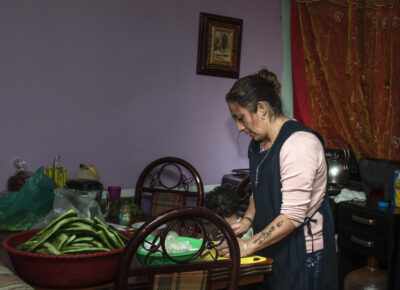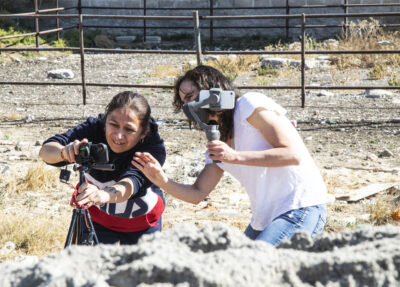In Mexican Dream, an honest story of motherhood, relationships, family, and friendship, filmmaker Laura Plancarte tells the story of María Magdalena (also known as Malena or Male). Filmed in a sensitive, intimate tone, this unique collaboration between film participant and director delivers a candid story.
Malena explores a second chance at motherhood with her new partner through IVF. Faced with challenges, she remains determined to mend the bond with her children from a previous marriage. Facing an uncertain failure and tired of her job as a domestic worker, Malena intends to have a financially independent life by building her own business.
Plancarte is a Mexican filmmaker who lives and works in London making films and art. Previously awarded for her documentary HERMANOS, it is evident her stories have resonated with audiences worldwide. To illustrate Magdalena’s story, the two worked closely alongside one another throughout the film. We connected with Plancarte to discuss the filmmaking process, challenges, and aspirations of this film.
“Mexican Dream” is described as a unique collaboration between film participant and director. Can you elaborate on how this collaboration influenced the storytelling process and authenticity of the film?
When I met María Magdalena’ in 2020, I knew from the beginning that I wanted to collaborate with her. Based on my prior work creating observational documentaries, I’ve found that participants have felt disappointed by their portrayal.In 2020 I gave Male an iPhone with accessories so she could film herself and I could blend our materials together.
After a year and a half of working this way, Male regained custody of her teenage children. While this was a positive development, it posed complications due to the fragile nature of their relationship and the vulnerability of her children. Consequently, I proposed that Male and I collaborate on writing instead of filming. This would allow her to protect her relationship with her children by giving them agency.
This film covers a variety of themes including motherhood, relationships, and pursuing one’s dreams. But what drew you into Malena’s story and how did you navigate the balance between capturing her personal journey?
I wanted to portray a strong woman who defies stereotypes about femininity, return to my roots in Mexico, and show a woman from poverty in a way that challenges clichés about her dreams and what she can achieve.
The day I met Male on zoom, I knew it was her who I was looking for. Not only her strength and charisma came across straight away, but her desire to have another child through IVF, despite her complex relationship with her teenage children and financial hardships, intrigued me. I realised she could challenge audiences to see a different side of a Mexican woman that comes from poverty, breaking stereotypes and shedding light on the complexities of femininity, motherhood, and Mexico’s unjust social structure.

Courtesy of Hot Docs
What aspects of Malena’s journey do you hope will resonate with audiences, especially those facing similar challenges of aspirations?
I believe many women will relate to Male and her story, as it portrays the complexities of motherhood, the struggle for recognition in the world, and the journey towards healing after experiencing domestic abuse—themes that resonate universally. In watching Male’s empowered yet realistic portrayal, women may find solace in witnessing a character who navigates various facets of femininity: the desire for love, career fulfilment, friendship, and the need for personal space—all within a societal framework that often expects mothers to prioritize their families above all else.
I’m not a mother myself, and it was eye-opening to witness not only Male’s journey but also the stories of the other women featured in the film. They too strive tirelessly to assert their voices and carve out their own spaces in a still largely patriarchal world. Moreover, delving into the topic of IVF, I believe that many women who have undergone the treatment will find a sense of companionship and understanding in the stories featured in the film, as it can be a heart-breaking process.

Courtesy of Hot Docs
What message do you hope the film will leave on audiences in terms of understanding the complexities of motherhood, relationships, and pursuing one’s dream?
I hope the film serves to challenge the notion that individuals from impoverished backgrounds have limited dreams, or that aspiring to bigger dreams is foolish. Who’s to dictate what someone can or should aspire to in life? I aim for the film to spark conversations about the societal expectations placed on mothers. It’s unfair and detrimental that women are often expected to sacrifice their own identities to fulfil the role of a ‘good mother’ in the eyes of society.
Through the film, I also hope to convey the message that there are always choices available to women. Being a mother is a significant responsibility and it’s not a path for everyone. Women should have the freedom to choose whether to have children or not, without feeling pressured by societal norms.




 Follow Us On Instagram
Follow Us On Instagram
